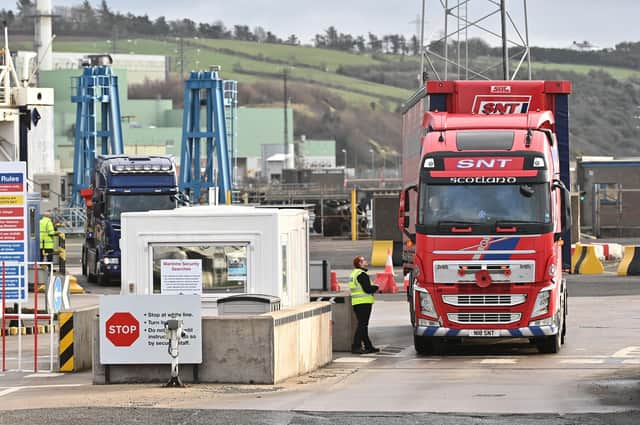Owen Polley: The DUP should not let down its guard on the Northern Ireland Protocol


Irish nationalists, the Dublin government, EU officials and others who are invested heavily in tearing Northern Ireland away from the UK’s economy and politics had an almighty tantrum.
Many unionists were wary, because, as Ben Habib pointed out in this newspaper (‘Protocol bill is a con,’ June 15, see link below), a lot of the legislation’s clauses would create powers for ministers to act against the sea border, rather than dismantling its key features immediately.
The bill throws up some unanswered questions.
Advertisement
Hide AdAdvertisement
Hide AdFor example, does Boris Johnson really intend to tackle the protocol, or will the prime minister use it as a “negotiating tactic”, as The Independent journalist, John Rentoul suggested in his Westminster newsletter?
Last week, The Times reported that the government would stop the legislation’s progress through the House of Commons after its first reading, unless the DUP agreed to restore Stormont quickly.
Senior sources told the News Letter’s Henry McDonald that ministers’ patience with the party was “wearing thin”.
With Boris Johnson’s history of misleading the DUP, it’s difficult to imagine how Jeffrey Donaldson could respond to these threats positively without at least losing face and electoral support.
Advertisement
Hide AdAdvertisement
Hide AdHowever, although this statement needs to be padded out with nearly endless caveats, the government’s protocol bill does represent progress, so long as it is passed and implemented without being watered down.
It’s true that many of its provisions create discretionary powers that the government may or may not use in the future. The bill would also leave some form of protocol in place, rather than destroying it completely.
Perhaps the legislation’s most significant clause, though, removes the assumption that goods moving from Great Britain to Northern Ireland are automatically “at risk” of entering the EU single market. It exposes the absurd pretence at the heart of the protocol: that products destined for Ulster are a threat to Brussels.
The bill turns that assumption of risk on its head. If the goods are going to be sold anywhere in the UK, including in Northern Ireland, rather than the EU, then, by default, they are not “at risk” of entering the single market.
Advertisement
Hide AdAdvertisement
Hide AdThis tactic would allow ministers to set up “red” and “green” channels, that may be based on a trusted trader scheme, so that goods or materials that will eventually be sold into the EU can be distinguished from goods for NI. Equally, it lays the groundwork for a dual regulatory regime, so that companies selling products here can adhere to either EU or British rules.
These provisions on trade are based closely on the ‘command paper’ of sea border solutions that Lord Frost and Brandon Lewis published last summer. They are designed to draw the protocol back to its supposed purpose, which was to target only products that were genuinely “at risk” of entering the single market in meaningful quantities.
The bill’s remaining clauses are supposed to ease some of unionists’ anxieties about sovereignty. The government says that it will assert its ability to make decisions on subsidies, VAT and other taxes, without being constrained by the EU’s attempt to grab powers over NI’s economy.
It also claims that the legislation would make British courts, rather than the European Court of Justice, the ultimate arbiter of protocol disputes. This is the kind of content that the unionist parties in Northern Ireland will be examining in detail, to determine whether it addresses their constitutional concerns effectively.
Advertisement
Hide AdAdvertisement
Hide AdDespite the hysterical reaction from Boris Johnson’s opponents, this bill comes nowhere close to dismantling the Irish Sea border unilaterally. If the intentions behind it are honest, and it achieves its purpose, it could restore genuine access to the UK internal market for Northern Ireland and resolve some of the more glaring constitutional issues created by the protocol.
It’s impossible to refute the argument made by the TUV leader, Jim Allister, that red and green customs lanes “confirm the partitioning of the UK through a border in the Irish Sea.” As usual, his logic is remorseless and impeccable.
At the same time, the bill exposes the lie at the heart of the protocol — the idea that trade between Great Britain and Northern Ireland puts the EU single market ‘at risk’. If the government removes that assumption it also destroys the rationale for ‘rigorous implementation’ of the sea border and solves most of the practical problems that businesses encounter sending goods here.
Whether the bill has merits or not, and it seems to me that it does, we’re still a long way from it reaching the statute book, never mind seeing it implemented in a way that restores Northern Ireland’s place in the Union. There is no room yet for the DUP, or other unionists here, to claim some kind of victory or let down their guard.
Advertisement
Hide AdAdvertisement
Hide Ad• Owen Polley June 13: Billy Bingham should have had a knighthood
• Ben Lowry June 18: John Bolton’s criticism of Ireland reflects a strain of US thinking
• WB Smith June 17: London should read John Oliver on Northern Ireland
Advertisement
Hide AdAdvertisement
Hide Ad• Esmond Birnie June 16: Why the Protocol status quo is not beneficial to Northern Ireland
• Barrister June 15: EU misuse of Belfast Agreement is biggest threat to NI stability since 1998
• Ruth Dudley Edwards June 14: Boris has flaws but I still hope he’ll unlock protocol
• Peter Robinson June 14: DUP should stay out of Stormont until protocol bill is fully enacted